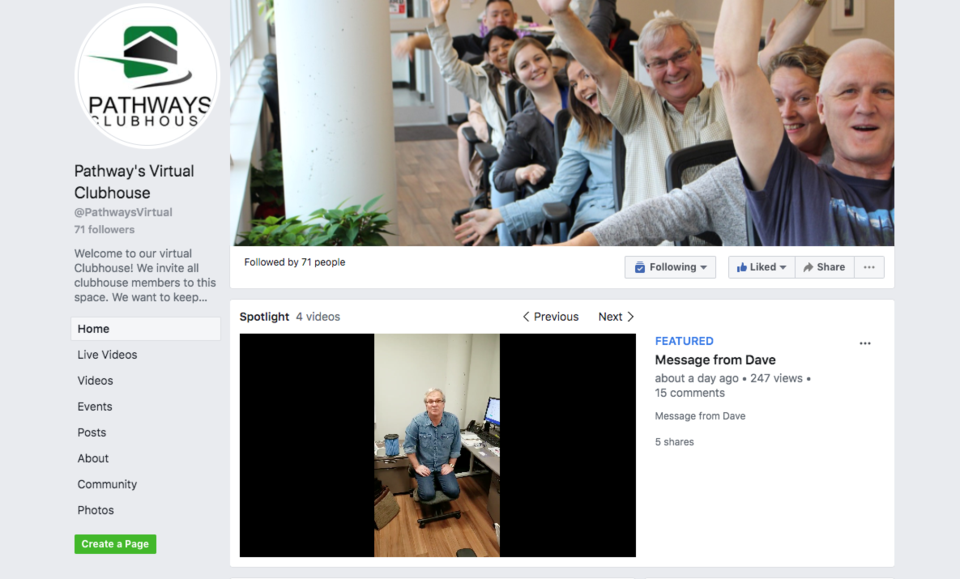The widespread shutdown of places where vulnerable people usually meet, congregate and access services is putting them in an even more precarious position.
Seniors, people without homes or with very low incomes, those with mental health challenges and those with physical disabilities rely heavily on Richmond’s non-profits, service agencies and churches to stay healthy, fed and connected.
But to combat the spread of the coronavirus (COVID-19), everyone is being told to practice social distancing, and this means community services are quickly changing from social activities to distance activities.
Sit-down meal programs are turning into takeout programs, face-to-face interaction is turning into virtual interaction and volunteers are stepping back.
Pathways Clubhouse on Granville Avenue shut its doors to its members on Monday because of fears of the virus spreading, but it has morphed into Pathways Virtual Clubhouse on Facebook and is looking at setting up on WeChat as well.
On a normal day, Pathways, which supports people with mental health issues, is buzzing with activity, with dozens of members involved in a variety of social activities, many of them accessing the $2 hot lunch program.
On Thursday morning, they livestreamed a fitness class on Facebook and on Friday it was a stretch class – activities members would normally take part in at Storeys.
Dave MacDonald, executive director of Pathways, said they are planning for the long haul on how to still keep people connected and involved with activities.
“We just want to adapt what we’re doing to the needs of our members,” he said.
Besides setting up on social media, MacDonald’s team is still making meals and this week delivered them to 20 of their members.
But for those working through Pathways’ supported employment program, only one site out of 20 is still running while the rest have shut down.
For staff, there are social adjustments as well – MacDonald said he, too, wants to be socially connected.
“We as staff are feeling lonely and lost as well,” he said.
With so many facilities shut down in Richmond, De Whalen, chair of the Richmond Poverty Response Committee, is concerned about how chronically homeless people will get food and where they’re going to go in the daytime. Many homeless people access the libraries and community centres during the daytime – all of these as well as other public amenities are closed for the foreseeable future to stop the spread of the virus.
When there is a crisis, it’s always the vulnerable who are always hit the hardest, Whalen said.
Whalen has been in contact with city hall, trying to see if there are some sites that can be opened up for the homeless to go to during the daytime.
Churches are often the “lynchpin” in communities to provide basic services for the vulnerable – food, clothing, showers - but with these shutting down, it’s leaving the vulnerable population even more at risk, Whalen said.
St. Alban’s Outreach and Advocacy, a non-profit that operates out of St. Alban Anglican Church, has cut its Saturday morning shower program that normally has 25 to 35 attendees – those coming to take a shower also get a hearty bacon-and-eggs breakfast after.
The St. Alban’s Tuesday community meal, that usually attract 170 people, and its Friday lunch have both turned into takeout services.
St. Alban’s Sunday food hamper delivery program, which services about 70 people every week, however, will continue.
For low-income people who are housed, many spend all their money on rent and rely on free meal services and the food bank to feed their families.
Some people attend the meal program for the social aspect, while others attend because they need the food, said Dianne Woodhouse, nurse-advocate with St. Alban’s Outreach and Advocacy.
“We didn’t want to shut down because people really need it,” she added.
She, too, is worried about more vulnerable people in Richmond, who are already stigmatized. So keeping some services in place was a priority.
At Richmond Cares Richmond Gives, president and CEO Ed Gavsie wanted to ensure, although many of their programs are shut down and their staff is doing a lot of work from home, that house-bound people still got their grocery deliveries.
So, while their volunteers have stepped back during this outbreak to reduce the risk of spreading the virus, staff have taken over grocery delivery services to make sure their house-bound clients get food.
But the current health crisis means RCRG can’t do any new intakes for this program and only have the capacity to deal with their current clients, Gavsie said.
And for their day-to-day work, all 19 staff members will be working from home to practice social distancing, something they decided on early this week.
Many programs had already been suspended at RCRG before this decision was taken, for example, programs to drive seniors to appointments and to visit and socialize with isolated people have been halted.
The Childcare Resource and Referral’s library at RCRG, which provided activity bins and books for childcare workers, has also been shut down.
But RCRG staff continues to be in contact with their clients to make sure they’re doing okay.
“We don’t anyone to think we’re not there,” Gavsie said.
For all the latest news on COVID-19, click here.



